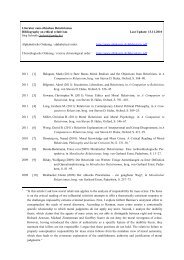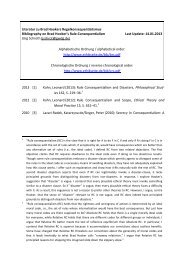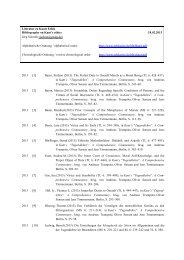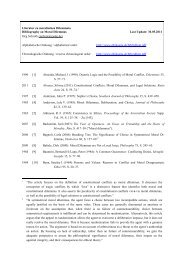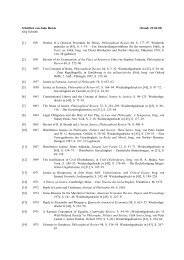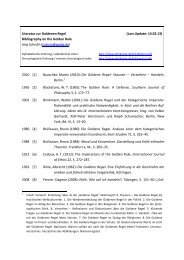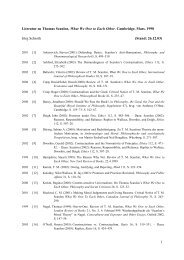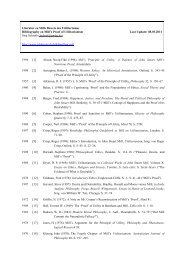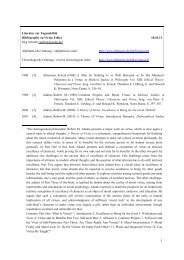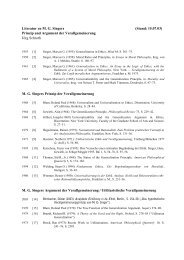Literatur zu Kants Ethik - Ethikseite
Literatur zu Kants Ethik - Ethikseite
Literatur zu Kants Ethik - Ethikseite
Create successful ePaper yourself
Turn your PDF publications into a flip-book with our unique Google optimized e-Paper software.
Ethics. Essays for John Rawls, hrsg. von Andrews Reath, Barbara Herman und<br />
Christine M. Korsgaard, Cambridge, S. 187–213. Revidierte Version in Herman,<br />
Moral Literacy, Cambridge, Mass. 2007, S. 51–78.<br />
1998 [440] Herman, Barbara (1998): Training to Autonomy: Kant and the Question of Moral Education,<br />
in Philosophers on Education [New] Historical Perspectives, hrsg. von Amélie O.<br />
Rorty, London. Revidierte Version in Herman, Moral Literacy, Cambridge, Mass.<br />
2007, S. 130–53.<br />
2001 [441] Herman, Barbara (2001): Rethinking Kant’s Hedonism, in Fact and Value: Essays on Ethics<br />
and Metaphysics for Judith Jarvis Thomson, Cambridge. Revidierte Version in<br />
Herman, Moral Literacy, Cambridge, Mass. 2007, S. 176–202.<br />
2002 [442] Herman, Barbara (2002): The Scope of Moral Requirement, Philosophy and Public Affairs 30,<br />
S. 227–56. Wiederabgedruckt in Herman, Moral Literacy, Cambridge, Mass. 2007, S.<br />
203–29.<br />
2006 [443] Herman, Barbara (2006): Reasoning to Obligation, Inquiry 49, S. 44–61. 52<br />
2007 [444] Herman, Barbara (2007): Moral Literacy, Cambridge, Mass.<br />
Da<strong>zu</strong>:<br />
Reath, Andrews (2011): Will, Obligatory Ends and the Completion of Practical Reason:<br />
Comments on Barbara Herman’s Moral Literacy, Kantian Review 16, S. 1–15. 53<br />
Engstrom, Stephen (2011): Herman on Moral Literacy, Kantian Review 16, S. 17–31. 54<br />
Sedgwick, Sally (2011): ‘Letting the Phenomena In’: On How Herman’s Kantianism Does and<br />
Does Not Answer the Empty Formalism Critique, Kantian Review 16, S. 33–47. 55<br />
52 “If, as Kant says, “the will is practical reason”, we should think of willing as a mode of reasoning, and its<br />
activity represented in movement from evaluative premises to intention by way of a validity-securing<br />
principle of inference. Such a view of willing takes motive and rational choice out of empirical psychology,<br />
thereby eliminating grounds for many familiar objections to Kant's account of morally good action. The<br />
categorical imperative provides the fundamental principle of valid practical inference; however, for good<br />
willing, we also require correct premises. These come from specifications of the two obligatory ends – our<br />
own perfection and the happiness of others. Interpreting good willing as good reasoning not only fits well<br />
with Kant's metaphysics of free action, it also offers a sound method for reasoning to and about individual<br />
as well as role-dependent moral obligations.”<br />
53 “This paper discusses three inter-related themes in Barbara Herman’s Moral Literacy – the idea that, for<br />
Kant, the will is a ‘norm-constituted power’ whose activity is guided by its own internal norm, that the<br />
obligatory ends are reasonably viewed as the ends of all rational choice, and that morality ‘completes’<br />
practical reason or rational agency.”<br />
54 “In her recent book, Barbara Herman explores a range of topics commonly associated with virtue ethics; her<br />
focus, however, is not so much on virtue as on normal moral competence and the basic moral capacity<br />
underpinning it. To explicate this competence, Herman introduces the idea of moral literacy, arguing that it<br />
reveals Kantian ethical thought to be better able than Humean views to account for our readiness to hold<br />
persons responsible even for conduct reflecting character flaws that stem from deficiencies in their<br />
upbringing. Examination of Herman's account raises a question, however, about how intimately moral<br />
literacy is related to the basic moral capacity.”



